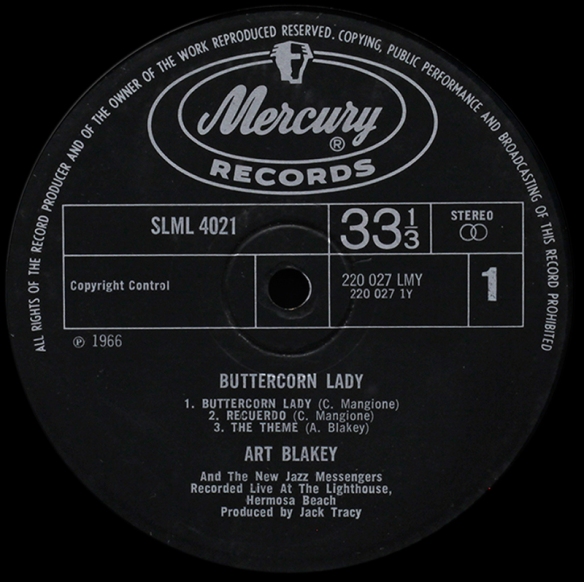Dedicated Japanese collector and documentor of the Mercury label Matsubayashi ‘Shaolin’ Kohji has done a better job than I could ever, so just follow the link
http://microgroove.jp/mercury/
However, I have some of my own. Work in progress only
Mercury Corporate History (abbreviated from Wiki)
 Mercury Record Corporation was formed in the American city of Chicago in 1945 by Irving Green, Berle Adams and Arthur Talmadge. They were a major force in popular and classical music. Early in the label’s history, Mercury opened two pressing plants, one in Chicago and the other in St. Louis, Missouri, to compete with the majors.
Mercury Record Corporation was formed in the American city of Chicago in 1945 by Irving Green, Berle Adams and Arthur Talmadge. They were a major force in popular and classical music. Early in the label’s history, Mercury opened two pressing plants, one in Chicago and the other in St. Louis, Missouri, to compete with the majors.
Mercury’s jazz division had two distinct and important fathers. John Henry Hammond, Jr. brought his expertise and connections when Mercury bought Keynote Records in the late 1940s. And Mercury was the issuing company and distributor for Norman Granz’s pre-Norgran/Verve recordings. Although both Hammond and Granz had departed Mercury by the mid-’50s, Norman Granz starting his own record company, Norgran, which later became Verve. However they established Mercury in the jazz world.
Mercury, under its EmArcy label, released LPs by many important post-swing and bebop artists, and by the early 1960s, Mercury was releasing jazz under the flagship label, Emarcy and later, Limelight, and was an early leader in the new stereo sound releases (“Living Presence”). Both Mercury and Verve are now owned by Universal Music Group and Mercury’s jazz library falls under the Verve division
Of interest to UK collectors, in 1963, Mercury switched British manufacture and distribution from EMI to Philips, hence the change found in UK label design and matrix codes. The pressings by Philips are just a little dull and lacking presence compared with Philips usual standard, suggesting an issue not so much with Philips engineering but possibly the copy tapes sent by Mercury from the US may not have been “first generation” standard. As is the case with Columbia, US editions have the edge and are to be preferred.
Labelography
1. US MERCURY MONO LONG PLAYING MICROGROOVE
2. US MERCURY STEREO LONG PLAYING HI FIDELITY
3. US MERCURY EMARCY
4. US MERCURY LIMELIGHT
5. MERCURY EMARCY JAZZ UK EMI PRESSING
6.MERCURY RECORDS no (R) – UK EMI PRESSING
7. MERCURY RECORDS (R) “LIMELIGHT SERIES” UK MONO PHILIPS UK PRESSING 1965
8. MERCURY RECORDS (R) (UK PHILIPS PRESSING) STEREO 1966
Work in progress continues








Has London Jazz Collector any knowledge about a japanese reissue series of Mercury vinyls in 1982 with a cat# prefix EXPR ? This series was manufactured in Japan but should be for the US market only.
There was an ad in Downbeat Volume 1982.
Thanks
LikeLike
Hi.We are preparing a Jazz section for our site and have a number of white label test pressings some of which have the SMWL prefix hand written on their respective plain covers (21043-apparently – Roland Kirk Quartet, 21049 – unknown and 21056 – apparently Charles Mingus). They are Philips European pressings with matrices: 134608/220009/134613 respectively. Probably pressed late 60s as all the other TPs date from this period onwards. Any usable info will be acknowledged on our site.Thanks!
LikeLike
How would you rate UK Mercury EMI 1958 pressing of Clifford Brown/ Max Roach sessions from 1955/6?
LikeLike
In my experience UK Mercury pressed by EMI Hayes are very good but not as good as the original US pressings.EMI have generally a very good track record, like the excellent EMI HMV pressings of Impulse recordings. However the only way to know is to buy.
LikeLike
Seen a 1963 comp, mono US Mercury MG 20827, Remember Clifford – worth a punt over earlier UK pressing?
LikeLike
My US originals always shine, but you can’t know for sure what will sound good unless you try. I try to ensure I have a return option, even if it wastes me postage.
LikeLike
I bought the mono US Mercury Clifford Brown – fantastic soounding record! Very chuffed. Thanks for advice and comment – I consult several of your excellent, clear postings, especially about original labels, matrix identifiers, etc – invaluable info for collectors, and from a buyer’s perspective. I’ve really started noticing the vague, odd language some sellers use when describing a particular record: a record listed as VG with a note saying it was in fact VG+! So, what condition is that record in? Er… Smoke and mirrors… The endless subdivisions of grading are also kind of ridiculous: VG-, VG++, VG+++, EX-, not helpful; used mainly to confuse rather than clarify in my experience. Still, I have bought some excellent old vinyl online, but the sellers who write the most detail often tend to be the least reliable when it comes to being accurate about how the record actually plays. I bought a wonderful first press UK Fontana of Miles Davis Milestones, graded VG+ and it doesn’t have a mark on it, plays like a dream! The same issue of that record I’ve seen for sale at three times the price I paid for it, in dreadful nick – scratches and marks all over it. Such a weird, wild world, secondhand vinyl hunting!
LikeLike